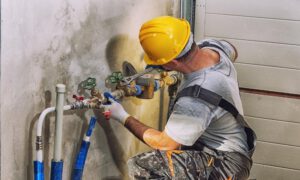If you are considering hiring a plumber, you should know that he specializes in installing drainage and potable water systems. These are the major functions of Plumbers. The best plumbers can handle any type of clogged drain or leaking pipe. These professionals specialize in different areas of plumbing, including drain cleaning, pipe installation, and sewage and septic systems. A plumber is someone who has extensive knowledge about different systems and can help you make sure that they are installed properly.

A plumber needs to be aware of a variety of building codes and safety standards. Plumbing laws vary by state and can be difficult to understand for the layperson. They must also be skilled at solving problems quickly and efficiently. Plumbing experts must be logical and creative in their approach. Their job duties may include inventorying materials, planning project schedules, and preparing reports. A plumber will often work alongside architects, so he can contribute valuable knowledge on where to put fixtures and where to route water lines.
Most plumbers work full-time, but they can work weekends, evenings, and weekends as well. The work is usually physically demanding, so many apprentices quit after only a few months of employment. However, once they have a steady job, the financial rewards are well worth the effort. Most plumbers earn more than average for a construction trade worker. If they are members of unions, their salaries can be negotiated. There are many other benefits to working as a plumber, including the possibility of unionization.
Plumbers can work in homes, businesses, and factories. Their jobs vary widely, from large pipe systems for buildings to smaller pipes for refrigerators. They may install toilets, water heaters, and dishwashers, as well as install fixtures. They may also unclog pipes and maintain septic systems. There are many different types of plumbing, so you should choose the type of work that best suits your needs. There is no set curriculum for becoming a plumber, but you should be familiar with the different types.
As mentioned above, plumbing is essential for health. Not only does it help maintain sanitation in homes, but it also helps provide clean water for people to use. Proper plumbing can ensure that clean water is available to individuals, making it possible to practice hygiene and sanitize operating rooms. Without clean water, sustainable health cannot be achieved. So, why would you not want to be one? So many benefits come from hiring a plumber. And if you have any plumbing issues, it’s best to contact a professional to ensure that they are installed properly.
As a plumber, you must be able to follow plans and instructions from the supervisor. Working on a construction site requires you to follow blueprints and drawings that show the planned locations of pipes, appliances, and fixtures. A plumber with these skills has a larger role in the design process, which can help you save money. Plumbing involves measuring and fitting pipes into the structure, so plumbers must be able to make the correct fit. If you hire a plumber for your next project, make sure that they have experience in that area.
The plumber has several specialties, including residential and commercial plumbing. While many plumbers perform the same basic tasks, their skills and expertise differ. A plumber who can repair pipes is not necessarily an expert in heating systems or opening drains. However, a plumber who can install a plumbing system can fix other types of pipes. If you are planning to hire a plumber, make sure to research the job thoroughly. This way, you will know what you’re getting into and what to expect from a plumber.
Plumbing is a skilled trade, but it doesn’t require a college degree. The training you receive will depend on the state you live in. Apprenticeships typically last four to five years. After completing an apprenticeship program, you’ll become a journey worker. Depending on your state’s requirements, you can achieve a master’s status after an additional few years of work experience. But make sure that you have a valid license from your state to work legally.
If you’re interested in working as a plumber, you should know the minimum requirements and the educational background. In some countries, you need to have a certificate IV in plumbing and an interim gas license. Plumbers are exposed to high levels of risk of infections because they handle human waste. Fecal matter, vomit, and sewage pipes contain microbes. This means that you’ll need to take precautions when working with human waste.